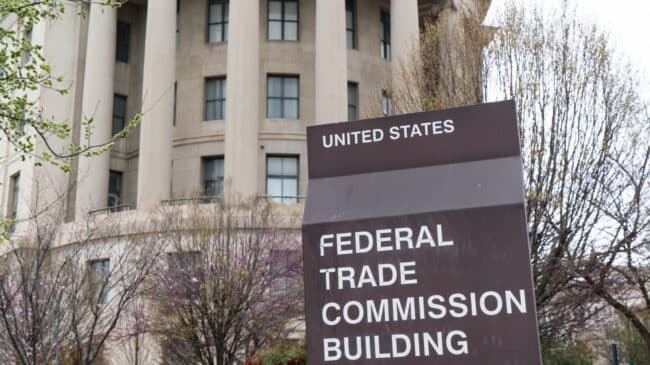The Federal Trade Commission (FTC) and politicians on both sides of the aisle are very concerned about Amazon. By one count, the FTC has six investigations of the company either ongoing or under consideration. These include a retail antitrust probe, a review of Amazon’s planned acquisition of vacuum maker iRobot, two privacy investigations stemming from features of Amazon products, a “dark pattern” probe into how consumers unsubscribe from Amazon Prime, and a false advertising case involving the “Amazon’s Choice” label.
Rather than preventing or punishing the specific acts covered by these investigations, the FTC’s apparent goal is to generally restrain what Amazon does as a large, dynamic company. Regulators “appear intent on fishing for something that could be massaged into allegations that Amazon’s size and reach harms consumers,” writes Reason.com’s Elizabeth Nolan Brown. The FTC appears less interested in winning specific cases than having a “chilling effect on Silicon Valley business dealings,” as National Public Radio put it, by signaling to companies like Amazon that it will face legal and regulatory trouble when it considers whether to make its next move.
It may be working. Tech mergers were down in 2022, and Open Markets Institute Executive Director Barry Lynn told NPR, “We have these enforcement agencies who now say, ‘We’re coming at you. The business that you’ve been engaging in for the last 20 years, that’s no longer feasible. We no longer regard that as legal.'”
The strategy also might be backfiring. One striking aspect of the rundown of current FTC investigations is its similarity to the approach that FTC Chair Lina Khan took in her infamous 2017 Yale Law Review paper “Amazon’s Antitrust Paradox,” where Khan produced a similarly long list of alleged anticompetitive behavior and leveraging of power by Amazon. None of those claims from years ago materialized into government action against Amazon. As a recent paper by the Information Technology and Innovation Foundation (ITIF) revisiting those allocations shows, there are strong and compelling legal arguments against each of them.
The FTC may also have misstepped by bringing to court a proposed acquisition by Meta of a virtual reality fitness app Supernatural. Khan had previously written as a congressional staffer that Meta should be blocked from all future acquisitions. That alleged that conflict of interest of Khan’s was one of the factors cited by former FTC Commissioner Christine Wilson in her public resignation letter). Gary Shapiro, head of the Consumer Technology Association, wrote he found the allegations particularly dubious. Ultimately, United States District Judge Edward Davila denied the FTC’s attempt to place a preliminary injunction on the merger, stating the FTC did not demonstrate the likelihood of success based on the merits of its case.
However, it would be a mistake to judge the FTCs discretionary use of government power primarily on whether we like its intended outcomes or whether it succeeded. This strategy of government going after specific actors it judges to be bad appears to be gaining popularity on both sides of the political aisle. All Americans should be concerned about this development. For both left and right, wielding power in this manner neglects complex realities and often backfires.
Khan’s FTC is but one recent example of politicians and officials seeking to target big corporations or other organizations and leverage the power of the government to regulate them based not on rules but rather on their own judgment. During her 2020 presidential campaign, Sen. Elizabeth Warren touted a plan requiring all companies valued at over $1 billion to obtain a special charter that “tells company directors to consider the interests of all relevant stakeholders—shareholders, but also employees, customers, and the community within which the company operates—when making decisions.” Quantifying or standardizing all of these requirements is not possible, meaning such a charter would simply require companies to do what regulators want them to do.
Rather than fighting such regulatory overreach, some on the right have recently focused instead on what they would like to accomplish through the same means. Florida Gov. Ron DeSantis advocated rules preventing the state’s massive pension and other funds from considering environmental, social, and governance factors when investing. West Virginia Treasurer Riley Moore announced the state would refuse to do business with Wall Street firms reducing investments in coal and associated industries, taking up the banner of fighting “woke capital.” More recently these Will to Power conservatives have taken aim at academic departments espousing politics they don’t like, which Reason’s Emma Camp wrote would undercut academic freedom.
Many Republicans, of course, have their own agenda of regulatory overreach for the same technology companies currently targeted by the FTC. A document from Sen. Josh Hawley’s most recent campaign, titled “Overhauling the Federal Trade Commission,” reads nothing like the limited-government regulatory approach that was once part of the Republican Party’s brand:
The FTC has stood by as actors in digital markets violated the law to obtain monopoly power.
In a competitive market, extraordinarily high profit margins should not persist because those margins stimulate entry of new competitors over time, causing lower prices. Yet digital markets have been persistently dominated by a few actors who boast extraordinarily high profits. And we are seeing the same pattern in other industries. This trend toward monopolization has occurred on the FTC’s watch.
This is one reason why those on both the left and right should be concerned about discretionary and targeted power wielded by regulators and the executive branch. Partisans may hope to achieve lasting majorities in the national government, but more realistically, all Americans should expect the executive branch to be run regularly by people whose politics they disagree with, if it isn’t already. Given the examples above, both political sides should temper their enthusiasm for discretionary power aimed at goals they like and remember why we’ve traditionally imposed clear limitations and rules on executive and regulatory power.
Such limitations and rules also provide safeguards against, regulatory capture, an issue that has long concerned economists. Regulatory capture takes place when a company influences those making the rules to create a non-level playing field in the company’s favor. Companies naturally want those outcomes and will have more chances to push for them the more they interact with regulators.
If regulation is based on simple rules applying to companies equally, such as the consumer welfare standard that has been central to antitrust enforcement for decades, there are fewer opportunities for today’s large firms to subtly push rules in a direction that hurts the startups of the future more than the big players of today.
Today’s tech platforms, just like other industries, are best regulated by simple guiding principles and enforced not by the whims of those in power but when companies actually break the rules.

